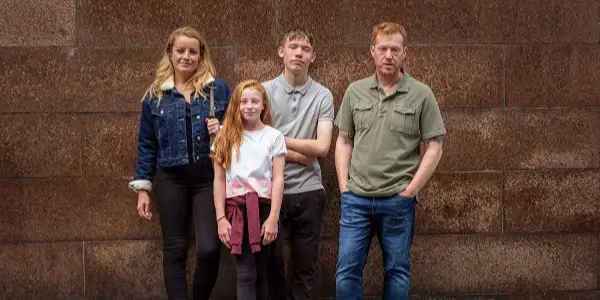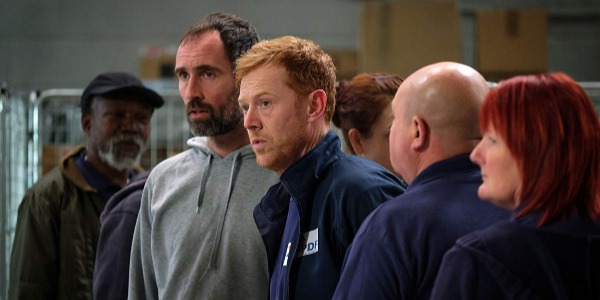Interview: Ken Loach, Director Of SORRY WE MISSED YOU

Alex is a 28 year-old West Australian who has a…
In his 25th feature film, director Ken Loach still displays no signs of pulling any punches. For a year that gave us IT: Chapter Two, Us and Doctor Sleep, it’s Loach’s latest collaboration with Paul Laverty, the suitably titled Sorry We Missed You, that is truly the scariest film of the year. The fear stems from how accurately it reflects our unstable society, focusing on the suffocating pressures of working in the gig economy.
Out of money, a job or any hope, handyman Ricky Turner (Kris Hitchen) has managed to secure work at a delivery company, with the explicit conditions being “you work with us, not for us”, a fancier way of absolving the company of any risk or requirement to provide its employees with liveable wages. The contract-less gig means long days, zero sick leave and any costs – accidental or not – being taken out of the employees’ pocket. It sounds like a post-apocalyptic situation, a debilitating situation that cascades to the rest of his struggling family.
As with every chapter of Ken Loach’s storied career, Sorry We Missed You is another naturalistic – but beautifully composed – call to arms against a broken social system, delivered with the same righteous anger that charged his previous Palme d’Or-winning hit, I, Daniel Blake. Ahead of Sorry We Missed You’s Australian theatrical release on December 26th, I had the chance to talk with Ken Loach about what drove him to make this film, finding moments of levity in his work, his thoughts on the state of public transport in the UK and if he’s seen the trailer for the upcoming Cats adaptation.
With I, Daniel Blake, there was a real palpable sense of anger and frustration driving that film, so for Sorry We Missed You, what would you identify as the key driving emotion this time?
Ken Loach: I think it’s a sense that we somehow managed to develop a system, which denies people basic human rights, dignity, security, being able to be with your family. It’s about stress and for work to fulfil its function, which is to provide an income to your family, whilst allowing you to spend time with that family and nurturing each other and taking care of each other, which is what a civilised society should do. A sustainable economic system should provide and of course it doesn’t – it provides the opposite.
I think we’re increasingly destroying human relationships. In the last 10 years – in Britain – with the new jobs that’ve been created, two thirds of them have been precarious work, no fixed income, no fixed commitments. And there’s one more stat if you can bear it and that is that we’ve got 4 million children in poverty. I mean that’s a huge number, and every quarter of their parents are working, so that’s the measure of the basic economy is to provide a decent life for them.
With this then, is it difficult to still find and bring out moments of levity?
Ken Loach: Yes, some moments of humor are needed, you’ve got change the subject. You’ve got to change the subject and with Paul Laverty, the idea emerged from our ongoing conversations that we should centre on a family because that’s where the stress appears. If you go to work – I’m sure for you, me and everyone – when you’re at work, you’ve got a public face and where you’re Mr. Cheerful or Mrs. Cheerful and that’s fine.
When you get home there’s things that you’ve got to sort out, you’re knackered, you’re exhausted and you’ve got restart the next day. That’s where the stress comes from, people run out of patience and they run out of time for their kids and their needs. The kids needs care.

How was Sorry We Missed You chosen as your follow up to I, Daniel Blake?
Ken Loach: When we were doing I, Daniel Blake, and we did that scene at the food bank, we were surprised that so many of the people who were coming in had somebody working in the family. So we then tapped into an ongoing concern over the past 40 years, about how the nature of work is changing, like how the old 8-5 job or manual work or even office work are going, they’re increasingly going away.
Personalized work is taking the place of fixed hours and the obligation on the part of the employer to pay the employee a profitable minimum wage is changing. All the responsibilities are being born by the worker, which is an ongoing preoccupation. The shock of seeing working people who are working not able to feed themselves – there are nurses in food banks, which is crazy – is what came together for us really.
From your perspective, now that the media landscape has changed, do you think movies and TV still has the ability to enact or trigger political change?
Ken Loach: Well, I’d like to think so. I think when television came, they thought it’d kill the theatre but of course it didn’t because the live performance is unique. And sitting in the cinema with an audience, it has a unique quality, which you don’t get if you’re sitting at home on your own, where you can press the pause button and make a cup of tea or you know, feed the cat or take the dog for a walk or whatever. It has a concentration and a collective response, which is unique and and it also means you are out of the house.
It’s something to look forward to and I think that’s special. And I think cinema will survive, I hope it does, but I’m sure it will, because it’s not the same as having something streamed into your house. Political intervention helps, because I think, like the funding of television, we should have small cinemas that can program films like ours, places that are not programmed by people who care about fast food but by people who care about films.
Throughout your work, Carla’s Song, The Navigators, I, Daniel Blake and Sorry We Missed You, there’s situations or conflicts that arise from failures regarding public transport. With them all being privatised – and the most expensive in the western world – how do you feel about the role that public transport plays in working class families?
Ken Loach: Churchill played a huge part in everything. It’s a key element to our infrastructure. In 1945 after the war, it was part of the settlement that they would take it and plan together and that of course it was all sold off and since then it’s been chaotic. In London, it’s expensive but there’s not a tangible system. If you’re in the outlying areas, it’s not good and most of the cities are outside London. So if someone’s doing essential work and has no car they’re reliant on the bus turning up, the bus may not turn up, they’re usually very late.
It’s a cliche joke isn’t it? You wait for the bus, it comes late and then 3 all show up at once. Of course, if you’re dependent on that to meet the appointments for your income, then it’s chaos. We need a policy that involves giving people efficient transport systems that they need for work and for other activities. It’d also save the planet by cutting down emissions of fossil fuels.
From Kes to Sorry We Missed You, you have always managed to portray kids/teens bright sparks and always redeemable, I remember in the documentary Versus you said that “all kids are remarkable”. I think for many people, Kes still holds quite an unfortunate resonance, bright kids slipping through the cracks because their potential is ignored or simply not mined. Do you see this situation ever getting better for the youth in Britain today?
Ken Loach: Oh we can get better. I mean we just needed to change the governments. Because families need services that will even the playing fields, as it’s hard for children to pursue what they love when they have to deal with things like class or tuition fees. These things make it hard for kids from disadvantaged backgrounds to have a fulfilled life and then work that is available is casual. It’s crap jobs basically, so then the youths are faced with that and they’re faced with easy money on the streets or organised crime or whatever, it’s easy for them to enter that way of life.
And then gangs appear, then the violence appears. And it stems from a lack of care by our collective actions. The actions of a government that should be there to develop the kids, so they can really lead interesting, fulfilled lives and that depends on sustainable work. And it’s just depends on care in those formative years from 15 to 20. Then anyone with kids knows that they’re vulnerable at that age and that’s when they’re becoming adults and it’s so easy to take a path that is going to lead to bad things.

As covered in the documentary Versus, I, Daniel Blake was a return from retirement. Now after this film, where do you see yourself going from here?
Ken Loach: Wait for a couple of weeks and then just have a breath of fresh air. Probably just do a few domestic chores, but I think I that’s it. Who knows? You take each game as it comes as they say.
On a lighter note, speaking to your love of musicals, do you have any particular favourites, and what are your thoughts on the upcoming Cats adaptation?
Ken Loach: [laughs] No, I’m afraid I don’t have any opinions on the new Cats, it’s a bit out of my zone now. When I was a kid I used to go out to musicals and I enjoyed them like everyone else, but they’ve taken a different turn now, which I don’t find so sympathetic. There is still a great enjoyment for attending theatre, for example when you have to make your way down the corridor to the toilet, hoping the loo is free and then scurrying back to seat so you don’t miss anything. I mean it is part of that comedy as well as what goes on the stage that makes the live experience.
Film Inquiry thanks Ken Loach for taking the time to talk with us.
Sorry We Missed You will arrive in Australian cinemas December 26th.
Does content like this matter to you?
Become a Member and support film journalism. Unlock access to all of Film Inquiry`s great articles. Join a community of like-minded readers who are passionate about cinema - get access to our private members Network, give back to independent filmmakers, and more.













